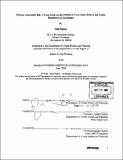| dc.contributor.advisor | Judith Tendler. | en_US |
| dc.contributor.author | Pipkin, Seth Daniel | en_US |
| dc.contributor.other | Massachusetts Institute of Technology. Dept. of Urban Studies and Planning. | en_US |
| dc.coverage.spatial | ncgt--- | en_US |
| dc.date.accessioned | 2007-06-28T12:20:24Z | |
| dc.date.available | 2007-06-28T12:20:24Z | |
| dc.date.copyright | 2006 | en_US |
| dc.date.issued | 2006 | en_US |
| dc.identifier.uri | http://hdl.handle.net/1721.1/37666 | |
| dc.description | Thesis (M.C.P.)--Massachusetts Institute of Technology, Dept. of Urban Studies and Planning, 2006. | en_US |
| dc.description | Includes bibliographical references (p. 69-75). | en_US |
| dc.description.abstract | This thesis makes two primary claims: first, that the US - Dominican Republic - Central America Free Trade Agreement (US-DR CAFTA, or CAFTA) has had important effects on labor regulation in Guatemala that are not contained in the explicit agreement text. These effects are referred to in the title as "invisible ink" because they constitute changes to labor law and regulation that would not have occurred without a trade deal on the table, but are nowhere mentioned in the text of the treaty. The second claim of this thesis is that the causes and meanings of invisible ink can only begin to be understood after a thorough consideration of domestic political and institutional history in countries undertaking the reforms that are the invisible ink. Based on five months of field work interviewing key actors in Guatemala and the United States, three examples are presented to illustrate these points: the first two are similar unionization efforts in Guatemalan apparel export manufacturers wherein the difference between success and failure meant tapping into the Guatemalan government's need to present itself to critics abroad, particularly in United States, as ready and competent to participate in the CAFTA. | en_US |
| dc.description.abstract | (cont.) The third is a case of rule reform in the Guatemalan Ministry of Labor that shows how informal pressure using CAFTA as leverage resulted in the creation and expansion of a specially-trained and successful commission of Inspectors. These Inspectors have in turn used CAFTA as a source of legitimacy in expanding their roles and reaching out to other actors in the private sector and civil society to reduce labor conflict and improve conditions for workers. The implication of these cases is that more opportunities exist for labor-friendly market reform if actors are willing to think beyond the formal rules contained within trade agreements. | en_US |
| dc.description.statementofresponsibility | by Seth Pipkin. | en_US |
| dc.format.extent | 75 p. | en_US |
| dc.language.iso | eng | en_US |
| dc.publisher | Massachusetts Institute of Technology | en_US |
| dc.rights | M.I.T. theses are protected by copyright. They may be viewed from this source for any purpose, but reproduction or distribution in any format is prohibited without written permission. See provided URL for inquiries about permission. | en_US |
| dc.rights.uri | http://dspace.mit.edu/handle/1721.1/7582 | |
| dc.subject | Urban Studies and Planning. | en_US |
| dc.title | Written in invisible ink : a case study on the politics of free trade reform and labor regulation in Guatemala | en_US |
| dc.title.alternative | Case study on the politics of free trade reform and labor regulation in Guatemala | en_US |
| dc.type | Thesis | en_US |
| dc.description.degree | M.C.P. | en_US |
| dc.contributor.department | Massachusetts Institute of Technology. Department of Urban Studies and Planning | |
| dc.identifier.oclc | 124064353 | en_US |
